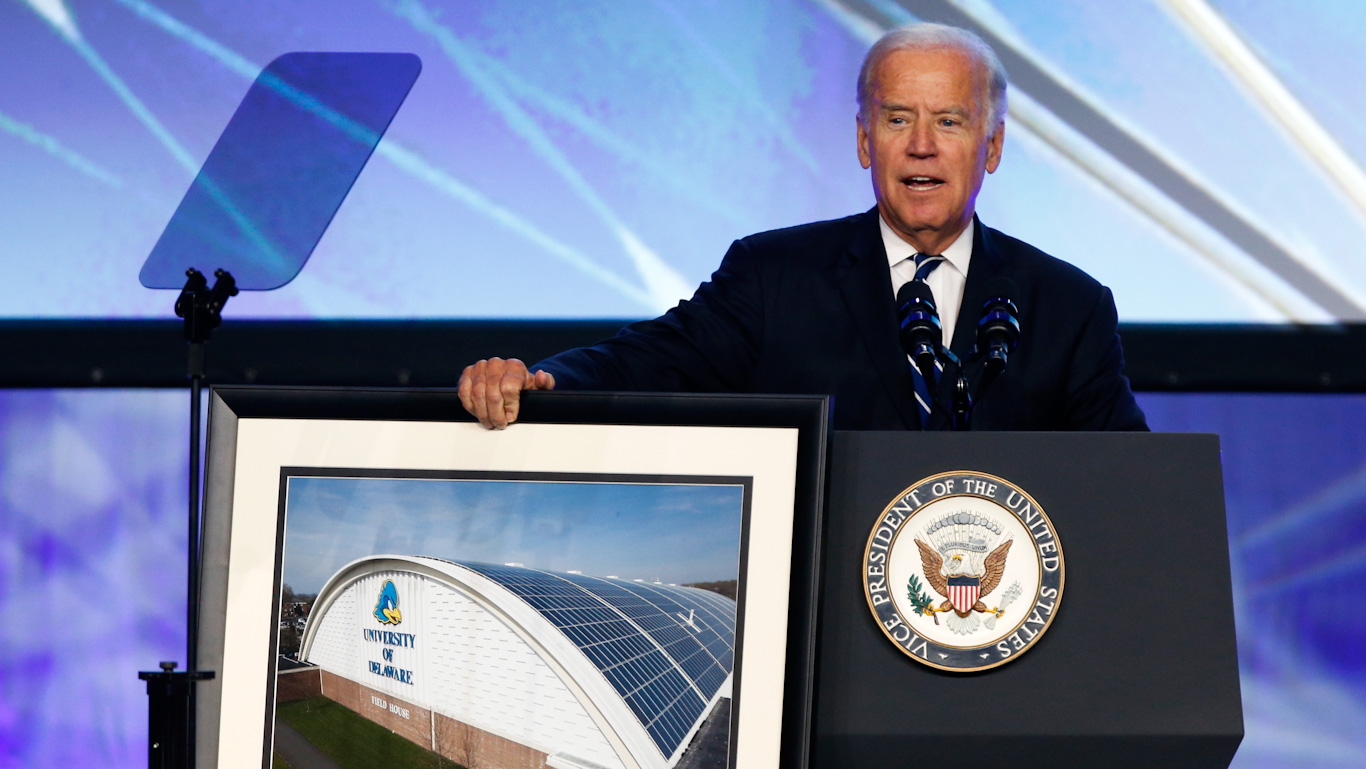Just before leaving office, Donald Trump asserted his executive privilege to deliver significant concessions to the mining industry, which culminated in the gift of sacred Apache territory to a foreign mining conglomerate covered earlier this month by MintPress. It also led to the irreversible loosening of industry regulations and greater access to federal lands.
In October 2020, the now-former president tapped into his trademark populist rhetoric to declare a “national emergency” for the U.S. mining industry and signed an executive order seeking to curtail China’s outsized control over the supply chain of rare-earth and critical minerals. That order directs the Department of the Interior to “use its authorities under the Defense Production Act (DPA) to fund mineral processing that protects our national security.” Contrary to popular belief, Biden has every intention to continue pressuring China on matters of trade and technology, and, according to White House spokeswoman Jen Psaki, the administration will be “evaluating” the tariffs imposed by Trump and is “committed to stopping China’s economic abuses.”
The directives in the executive action, which also include making more funding available for resource extraction projects and cutting down on red tape for the industry, place Deb Haaland, Biden’s nominee to head the agency, in an awkward position if confirmed. Haaland will become the first Native American to hold a cabinet-level position in the federal government, only to hand more power to the same corporations her brethren have been fighting for decades.
Nevertheless, the Biden administration is poised to forge ahead with Trump’s dictates, despite its much-ballyhooed reentry into the Paris accords on day one. The moral bankruptcy of the climate change industrial complex is laid bare as it marches on to the “green economy” by the unprecedented expansion in mineral extraction that is on the horizon. As the next man up on the political merry-go-round of the permanent state, Joe Biden’s messaging will be geared towards the more liberal segments of the American population, but his policies will differ little from the status quo. While publicly slamming oil drilling in the United States and canceling the Keystone XL pipeline (just one of the hundreds of pipelines already crisscrossing the country), he nonetheless promises to bring 500,000 charging stations to U.S. cities and towns as he reassures mining companies behind closed doors that he will not interfere with domestic production of metals.
The market has already recognized the trend with a 20% surge in the price of cobalt this year and the launch of a new rare-earth minerals exchange in Ganzhou, China on December 31 of last year. Cobalt, a ‘critical’ raw material, is used in conjunction with rare-earth minerals to make our most ubiquitous consumer electronics – from cell phones to laptops. It is also a vital component in electric vehicle (EV) battery manufacturing; a sector that is set to explode in the next decade as the “green” deals that aim to reduce carbon emissions and move towards so-called renewable energy comes online.
Fake horizon
The vast majority of the world’s cobalt supply is mined using child labor in the Democratic Republic of the Congo, where the increasing demand for the mineral has sprouted “artisanal” mining practices that exploit children. This sinister reality underscores the true costs of our modern-day technology and exposes the hypocrisy of the likes of Elon Musk, famously the CEO of one of the largest electric vehicle companies in the world, who recently offered a $100 million prize for the development of carbon capture technology – considered a “slick” scheme and wishful thinking designed to convince consumers that “climate-warming emissions can be stored underground”.
Our iPhones, laptops, or that $70,000 fully-equipped Tesla are far from the end of the story, however. An important driver of Biden’s incoming “green revolution” is the defense industry, which is in the throes of shifting to AI-driven technologies, a massive emitter of carbon dioxide, as well as other cyber, wind, and solar technologies – all of which require enormous supplies of rare-earth and critical minerals such as cobalt, nickel, copper, and lithium.

Still, the consumer market for electric vehicles and the burgeoning product landscape for the Internet of Things (IoT), which is projected to be worth trillions of dollars worldwide over the next five years, represents the next frontier of capitalist growth. Packaged as a compact to save nature, it is anything but. So-called “green” technologies have the potential to do more damage to our environment than any previous modality of resource consumption humanity has engaged in.
Keystone XL might have been halted, but it is unlikely that the huge copper mine slated for Oak Flat will run into any problems from the Biden administration. After all, the average electric vehicle uses approximately 80 kgs of copper and the EV sector will require 250% more copper for the charging stations alone, to say nothing of emerging EV markets like India, which is angling to replace gas-powered vehicles by 2030.
The unacceptable price of tech
Mining operations will still need fossil fuel-generated energy to power their earth-shattering equipment, not to mention the transportation and shipping required to move the payload to their respective markets. At the same time, the exponential increase in demand for these raw materials will result in scores of people – men, women, and children – being exploited for their labor as many of these resources can only be found in poor nations, which have been kept in debt by the sophisticated mechanisms of financial oppression of the West in order to have cheap access to these same resources.
In 2019, Apple, Google, Microsoft, Dell, and Tesla were sued by a rights advocacy group on behalf of Congolese families of children who were killed or maimed in the process of mining for the precious cobalt that these companies use to make their products. The class action was filed in the District Court for the District of Columbia based on the research of Siddharth Kara, an anti-slavery advocate, and lecturer at the Harvard Kennedy School of Government.
In an open letter Kara addressed to “anyone who uses a smartphone, drives an electric car, or flies on a plane”, he details some of the gruesome discoveries in the thirty-one mining sites he visited and the stark reality of the more than 35,000 children as young as six who toil in the oppressive heat and inside the dangerous tunnels, which mining conglomerates like Glencore operate in the Congo.
One of the victims’ relatives represented by International Rights Advocates in the lawsuit tells the story of her nephew, who was forced to work in a cobalt mine after the family was unable to cover the child’s $6 monthly school fee. The small boy was buried alive inside a tunnel that collapsed as he was collecting cobalt rocks for some kind of shiny tech device; maybe one of the latest iPhones people get free with a two-year contract with a carrier. His body was never recovered. Apple, Google, Tesla and the other tech firms named in the complaint have all filed motions for dismissal on the grounds that they cannot be held liable for the use of cobalt in their products.
Feature photo | Vice President Joe Biden speaks at the Solar Power International Trade Show in Anaheim, Calif., Sept. 16, 2015. Christine Cotter | AP
Raul Diego is a MintPress News Staff Writer, independent photojournalist, researcher, writer and documentary filmmaker.


